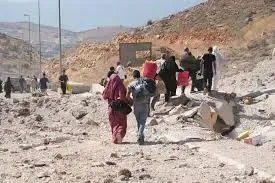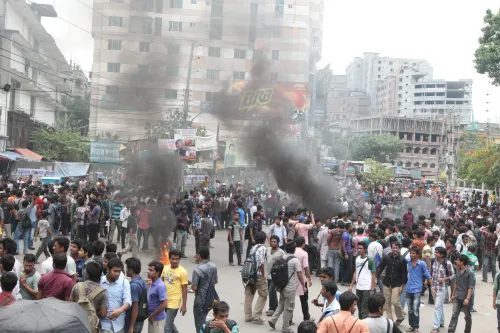Humanitarian Issues Intensify in Syria Amid Insecurity and Inflation: UN

Synopsis
Key Takeaways
- Insecurity concerns persist in northern and northeastern Syria.
- Economic challenges hinder humanitarian cash assistance.
- High fuel costs restrict humanitarian outreach to rural areas.
- Damascus faces a shortage of education personnel.
- Displacement camps suffer from extreme winter conditions.
United Nations, Jan 24 (NationPress) UN Humanitarians are raising alarms regarding the insecurity in the north and northeast of Syria, particularly with incidents occurring near a Euphrates River dam. They are also highlighting the economic turmoil that hampers cash assistance efforts.
The UN Office for the Coordination of Humanitarian Affairs (OCHA) has reported ongoing concerns about insecurity due to persistent artillery shelling and other incidents impacting northeastern Syria, especially in Al-Hasakeh Governorate and near the Tishreen Dam in northern Aleppo Governorate.
Economic challenges such as soaring prices and the absence of regional banking services are severely restricting cash assistance initiatives and disrupting the livelihoods of many, according to OCHA.
Due to escalating fuel and transportation expenses, humanitarian teams have largely remained in urban locations, leaving rural and remote areas without crucial services like counseling and psychosocial support.
In Damascus, high transportation costs have led to a significant shortfall of educators and teaching staff.
The cost of heating fuel has surged by 50% to 80% in certain regions, particularly in northwestern Idlib Governorate, where approximately 1.5 million individuals are residing in displacement camps. Those living in tents are facing severe challenges this winter due to limited heating access.
OCHA conducted a mission from Turkey to Aleppo city to discuss the critical plight in camps, especially during winter months. Last year, over 12,000 family tents and shelters in camps across Idlib and Aleppo were compromised by fires, floods, winds, and other calamities.
The office completed a field visit to the western rural regions of Aleppo, where partners engaged in cash-for-work, peacebuilding, and educational initiatives funded by the Syria Humanitarian Fund, as reported by Xinhua news agency.
Humanitarian workers noted a notable increase in returnees to the area, many of whom were displaced to northwest Syria. Families are now residing in damaged and looted homes, frequently lacking basic amenities like doors and windows.










